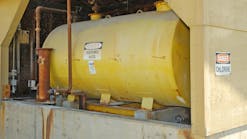Extra protection for Paris’s water supplies amid fear of further terror attacks
Just 10 days after Islamist militants struck Paris, plans are being put in place to protect the city’s drinking water supplies ahead of a Global Climate Summit.
Up to 450,000 people are expected to attend the summit taking place on November 30th, including 138 heads of state, to discuss how to prevent global temperatures rising.
French company Veolia has reportedly installed additional water network sensors to monitor pressure, chlorine levels and temperature, with the ability to detect if the water supply gets contaminated, according to the Guardian.
The newspaper quoted Jean-Louis Fiamenghi, head of security for Veolia as saying: “A terrorist could very well take advantage of this gathering to strike.”
Veolia declined to comment.
Although counter-terrorism and Veolia teams previously planned for the event, the attacks on November 13 which killed 130 people, have put security forces on high alert.
Similar sensors were used for the 2010 World Expo in Shanghai and at the London Olympics in 2012.
Meanwhile other media sources reported that city water company Eau de Paris’s water facilities are being guarded by the French army for fear of a chemical attack, after 12 protective suits were stolen from a Parisian hospital.
More than 30 protective boots, made of chemical-resistant polyethylene, have also been reported stolen.
The Expressquoted a spokesperson from Necker hospital in southwest Paris as saying: “The disappearance of this limited amount of equipment was noticed on Wednesday and a complaint has been filed."
As a result, French troops have been stationed at the water storage plants.
Eau de Paris is also said to have increased the amount of chlorine to its water supply at five sites.
A spokesperson was quoted as saying: “The water is always chlorinated for health reasons, but the dose injected has been raised. When the chlorine level drops, it means there is biological contamination.”
Backflow attacks are of great concern to the water industry and can occur when a pump is used to overcome the pressure gradient present in the distribution system’s pipes (read article).
###
Read more




